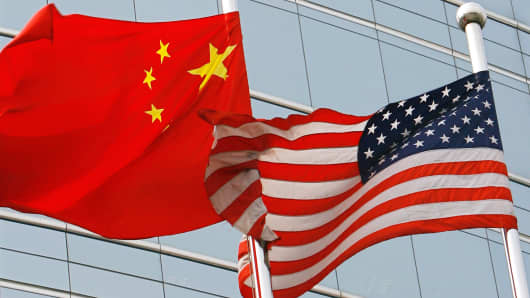This year is starting out with a bang for Chinese investment in the U.S. An unknown Chinese real estate and investment firm is buying the Chicago Stock Exchange. And China's Anbang Insurance Group is trying to beat out Marriott to buy hotel chain Starwood. Chinese investors are on a buying spree, and only three months into 2016, over $23 billion in Chinese deals may be headed for the U.S.
And we're already seeing a backlash. In the last few weeks, several Chinese deals have reportedly been stymied by the Committee on Foreign Investment in the U.S., an inter-agency committee that is tasked with reviewing foreign takeovers for national security concerns. Go Scale Capital's proposed investment in the LED lighting business Lumileds of the Dutch conglomerate Philips was scuttled after encountering "unforeseen concerns." The board of Fairchild Semiconductor International concluded that a deal with Chinese suitors presented a "non-negligible risk of a failure to obtain CFIUS approval." A subsidiary of China's Tsinghua University terminated its agreement to buy a stake in Western Digital Corporation when CFIUS decided to investigate the deal.
U.S. lawmakers have also sounded the alarm on Chinese investment, threatening new legislation to expand the scope of CFIUS's reviews, while other lawmakers demanded "a full and rigorous investigation" of the Chicago Stock Exchange deal and raised concerns about other deals. At the same time, CFIUS issued its annual report showing that, in 2014, it had reviewed more transactions from China than from any other country – for the third year in a row.
It's clear that CFIUS (pronounced SIH-FEE-US) is in the spotlight. To the uninitiated, its hard-to-pronounce acronym can conjure up visions of a Greek mythic figure pushing a rock uphill. But despite the Committee's obscurity, it is extremely important.
The committee, led by Treasury and made up of the U.S.'s top national security and economic agencies, including State, Defense, Commerce, and Homeland Security, vets foreign acquisitions of U.S. businesses for national security risks. The process usually takes 30-75 days, and while the vast majority of transactions pass muster, CFIUS sometimes imposes conditions that the investors never imagined. A small but increasing number of deals are abandoned while going through the process, but still the veto of a transaction is very rare. Only the president has the authority to stop a deal and it's only happened twice in CFIUS's 40-year history. Both times the buyer was from China.
While CFIUS's mandate is to assess national security risks, "national security" isn't defined. Traditionally, CFIUS focused on defense industries, but now it reviews transactions in a wide variety of industries, such as the purchase of Smithfield Foods, a pork producer, by China's Shuanghui.
In a world where national security threats can come from different directions and sources, assessment of risk is now less tied to any specific industry. Instead, it has more to do with the facts of each deal, ranging from whether the facilities being purchased are near military bases to whether the acquired company supplies the government.
The recent huge jump in Chinese investment in the U.S. is testing CFIUS in new ways. Continued significant investment from China raises questions about whether CFIUS can handle the influx of cases. News reports suggest that 2016 looks likely to have more reviews than ever before and more complex deals. Chinese transactions in particular often require a complicated assessment of the degree of government ownership and other less-than-transparent factors.
Moreover, CFIUS's mandate is to vet acquisitions on a transaction-by-transaction basis. It was not designed to accommodate serial purchases in one industry, such as those we have seen in the last year by China in the semiconductor industry. While each purchase alone might not by itself trigger alarms, repeated acquisitions in one industry could raise serious new questions about a buyout of a sensitive industry in its entirety.
But it's not all bad news – and it's not time for a panic or retreat for Chinese investors. While there are an increasing number of reviews by CFIUS of Chinese investment, it's because there is more investment by the Chinese in the U.S., not because there is greater scrutiny. Chinese acquirers are filing more transactions with CFIUS and, like transactions from all other countries, a vast majority of them pass muster. Chinese investors' willingness to initiate the process means that there is confidence that the process can be managed – and that deals will be successful.
Despite the rhetoric from the U.S., the reality is that the United States is open to foreign investment, and CFIUS is to be consulted – not feared.
Commentary by Anne Salladin, a former U.S. Treasury legal counsel who participated in more than 500 CFIUS reviews. She is now an attorney with Stroock & Stroock & Lavan's CFIUS practice.
For more insight from CNBC contributors, follow
@CNBCopinion
on Twitter.




